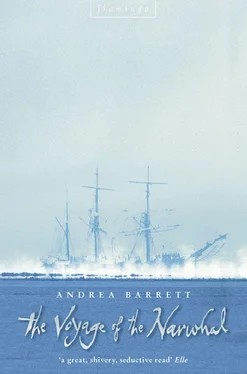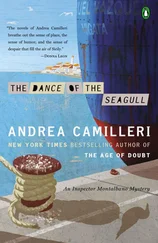“Of course we forbade this kind of display among our converts,” Joe said. “No nakedness, we told them. And no exchanging wives.” Afterward Erasmus, who’d overheard part of his story and seen the men’s faces, spoke sharply to him.
EVERYONE WAS TIRED and hungry for fresh meat; with Zeke still sulking over the dogs, Erasmus took matters into his own hands and went ashore July 28 with Isaac Bond. The first caribou he’d ever seen bolted across the boggy ground, fleeing before the swarms of insects and then before Isaac, who shot four times and brought down two. They peeled the skins off carefully. In their hindquarters, Erasmus found freshly laid eggs of the warble fly and, in the hides, hundreds of holes where the larvae of a previous year’s infestation had eaten their way out. Isaac, wielding a long knife, regarded the skinned purple carcasses and said they weren’t so different from the deer he’d hunted as a boy. He cut off the heads, took out the tongues; peeled off the flesh, set the skulls aside.
Side by side they crowned a rock, antlers branching above white bone and lidless eyes. Erasmus, under their gaze, knelt and pointed out the joints most easily severed. Left went the knife, and right and left and down: intestines steaming, a large smooth liver, stomach pouring out masses of green paste. In another pile ribs and shoulders, haunches and loins and tongues. They wrapped the meat in the skins and Erasmus hefted his end of one bloody bundle and then froze at the sight of his own reflection in the eyes. The thread of their voyage had broken, he thought, the plot unraveled, the point disappeared; nothing was left but the texture of each moment and the feeling of his soul unfurling after years in a small dark box.
“Are you all right?” Isaac said. “Is this too heavy?”
The caribou were watching themselves being carried away. “Let’s try to drag the bundles,” Erasmus said. “Down to the boat.”
The odd humming feeling persisted in his head. And when he and Isaac climbed aboard the Narwhal and found Zeke standing on the quarterdeck with Joe, talking to three Esquimaux while the crew gawked from the bow, at first Erasmus thought he’d hallucinated them.
“They’re so short ,” Isaac whispered.
He stepped back toward the railing, and Erasmus involuntarily squeezed the meat in his arms. What if these strangers were dangerous? Or if the crew members did something to anger them? Zeke and Joe had no weapons; Erasmus, leaving Isaac to deal with the bloody mass, hurried to Zeke’s side.
Joe and the Esquimaux spoke at some length. Then the Esquimaux stood quietly while Joe explained that these people, very different in dress and habits from those they’d met at Godhavn, wandered inland each summer in small family groups, searching for caribou. The camp of this particular group, Joe said, was several miles away, out of sight of the ship—they’d seen the hunting party, and had sent a delegation to investigate. “They invite our leaders to their camp,” Joe said. “Three of us, to go with the three of them.”
Zeke said, “You and me, of course.” He was silent for a minute. “And Captain Tyler,” he added.
Erasmus felt a little thrill at the idea that his figure, crouched near the skulls, had been the sight that drew the Esquimaux; then a fierce disappointment that he should not be included in the delegation. When he took Zeke’s arm and begged to come, Zeke shook him off and said he couldn’t ignore Captain Tyler’s rank.
The crew watched in silence as the six men dropped down the side of the brig, rowed to shore, and disappeared over a low hill. Three and three, dressed entirely differently, Zeke’s pale hair glowing behind the darker heads. The crew murmured behind them: suppose they’re murderers; suppose they’re cannibals; suppose they’re plotting to return with a great crowd and take over the ship —Fletcher Lamb with his bandaged hand, Barton DeSouza, Robert Carey.
Out loud, over the muttered comments, Dr. Boerhaave said, “What if they don’t come back?”
“There’s no point in even thinking like that,” Erasmus said. Although he was worried himself; if something happened to Zeke, how would he explain to Lavinia that he’d stayed safely on the brig?
“Shall we look at the bones from the mergansers?” Dr. Boerhaave said. “I finished the other set while you were hunting.”
From the sea he pulled a dripping sack. The water was boiling with Cancer nugax ; he and Erasmus had learned to take advantage of the little shrimps’ hunger, hanging their roughly cleaned skeletons over the side in a fine-mesh net. Erasmus, still distracted, opened the sack to find that the voracious creatures had cleaned everything perfectly. The sight of the disarticulated bones calmed him a bit.
Dr. Boerhaave, making notes, said, “I’m ashamed to admit this, but—don’t you sometimes experience the search for Franklin’s remains as just…distraction? I wish our only task was simply to observe this amazing place and its creatures.” In the breeze his soft brown hair with its streaks of gray lifted from his forehead and fell and lifted again, like partridge feathers.
“But it’s not,” Erasmus said, clutching a fistful of wing bones. He looked down at the beautiful planes and knobs in his hands. Zeke would be fine, he had Joe to help him; the Esquimaux had seemed quite friendly. “But I know what you mean. Would you pass me that wire?”
When he looked up again it was early evening, and Zeke and Joe and Captain Tyler were hopping back onto the deck unharmed. Erasmus followed Zeke down into the empty cabin, a jawbone still in his hand.
“Tell me,” he said. “Tell me everything.”
“It went well,” Zeke said. “Joe didn’t have much trouble interpreting—he says the dialect is similar to that of the West Greenlanders. They liked our gifts.”
Up on deck, Captain Tyler began lashing down everything movable. “Esquimaux will steal anything,” Erasmus heard him tell the men. “Everything. And you can be sure they’ll be visiting now that they know we’re here.”
“But—what were they like?” Erasmus asked Zeke. “What were they wearing? What were they eating? What do their dwellings look like inside?”
“Interesting,” Zeke said. “Different. I was concentrating on the conversation with our host. Don’t you want to know if I heard any news of Franklin?” A huge smile split his face. “I’ve been waiting years for this,” he said. “Don’t you understand? Ever since I was a boy reading your father’s books.”
Suddenly he looked like that boy again, and Erasmus was reminded of something Lavinia had told him a few days after her birthday party. “How can I discourage him from this trip?” she’d said. “We fell in love talking about Franklin, you don’t know how many hours I’ve spent listening to his stories and plans. He cherishes that in me, he says he loves the way I listen.” Erasmus had asked her if she truly shared Zeke’s enthusiasm, and she’d sworn she did. Or at least one part of it: “I admire Franklin’s wife,” she’d said. “Her steadfastness.”
“I’m sorry,” Erasmus said, abashed. “Of course I want to know.”
“I asked the oldest man point-blank if he’d ever seen a ship frozen in the ice, or white men marching anywhere around here,” Zeke said. “He said no but I thought I saw him exchange a look with the man sitting next to him. They’ve asked us to return tomorrow. Will you come?”
OF COURSE ERASMUS went, as did Ned, Mr. Tagliabeau, Thomas Forbes, several other men, and Joe—still their only interpreter, despite all the evenings Zeke had spent with him, transcribing into his black book Joe’s version of the Esquimaux names for things. This time Captain Tyler, Mr. Francis, and a small detachment stayed behind to guard the ship. Dr. Boerhaave nearly stayed behind as well; Fletcher Lamb had returned to his hammock, complaining of shooting pains in his limbs and face, and Dr. Boerhaave was worried. But there was nothing he could do for Fletcher after giving him a few drops of laudanum, and so he joined the delegation.
Читать дальше












